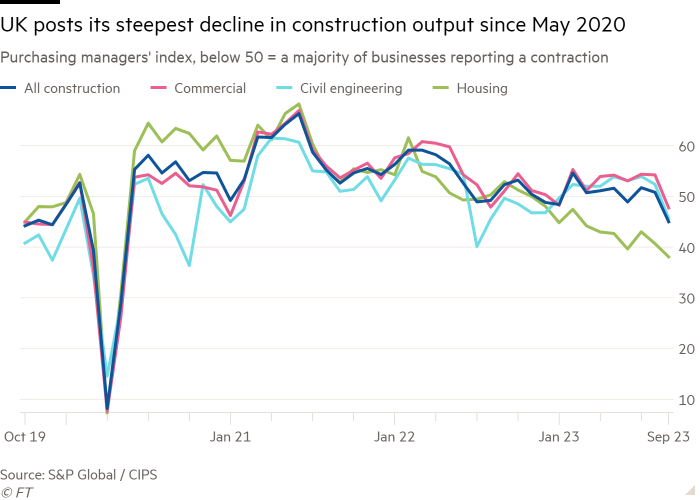Obtain free UK financial system updates
We’ll ship you a myFT Each day Digest e-mail rounding up the newest UK financial system information each morning.
UK development exercise posted its greatest month-to-month slide since Might 2020 as a steep downturn in housebuilding led to a higher than anticipated fall in September, in keeping with a intently watched survey.
The S&P World/Cips UK development buying managers’ index dropped to 45, down sharply from 50.8 in August and properly beneath the 49.9 forecast by economists polled by Reuters.
A studying beneath 50 signifies that the majority companies have reported that exercise has contracted.
The info offered extra proof that increased rates of interest are weighing on demand within the UK economy as supposed by the Financial institution of England in its battle in opposition to excessive inflation.
It comes as a separate survey revealed by the BoE on Thursday steered that the labour market had continued to chill.
The BoE left its rate of interest unchanged at 5.25 per cent in September after a sequence of rises. James Smith, economist on the financial institution ING, mentioned the Thursday information would “bolster the case for one more ‘on maintain’ choice in November”.
Development corporations blamed the slowdown on “cutbacks to new residential growth initiatives within the wake of sluggish demand and rising borrowing prices”, mentioned Tim Moore, economics director at S&P World Market Intelligence, which compiles the survey.
Companies within the residential sector carried out worst, with a studying of 38.1 — its steepest downturn since April 2009, other than when the development sector was shut down in the course of the coronavirus pandemic.

Business and civil engineering exercise additionally contracted in September, reversing the stable progress seen all through the spring and summer season. Builders famous that worries concerning the financial outlook had damped consumer demand.
The gloomy information comes the day after the federal government introduced axing the HS2 rail venture. Kelly Boorman, accomplice and nationwide head of development at RSM UK, mentioned: “The scrapping of HS2 will undoubtedly derail the pipeline of future exercise for a lot of contractors and their provide chain.
“Coupled with the delay in mobilising new infrastructure initiatives not even introduced by the federal government, it will put some companies in danger and create additional business uncertainty,” she added.
The survey additionally confirmed that the roles progress slowed within the sector to its weakest since June, whereas the usage of subcontractors decreased for the primary time since January.
Additionally on Thursday information from the BoE’s September Resolution Maker Panel, a month-to-month survey of UK chief monetary officers, confirmed that companies count on inflation within the yr forward to be 4.9 per cent.
The determine was marginally up from the 4.8 per cent reported in August, however properly beneath the latest peak of 9.5 per cent reached in September final yr.
Firms additionally predicted that wages would improve by 5.2 per cent, up from 5 per cent in August, however down from 6.3 per cent in December 2022.
Tomasz Wieladek, economist on the funding firm T Rowe Value, mentioned the survey mirrored the rise in costs on the petrol pump, which rose by 13 per cent since August.
He added that the average improve in inflation expectations means that the easing in underlying value pressures coming from weaker demand “greater than offset a really massive transfer in oil costs”.
The BoE information confirmed that companies have been discovering it simpler to recruit staff, with 55 per cent reporting that it was a bit of or a lot more durable to seek out new staff, down from 57 per cent within the earlier month and properly beneath the 84 per cent they reported in the identical month final yr.